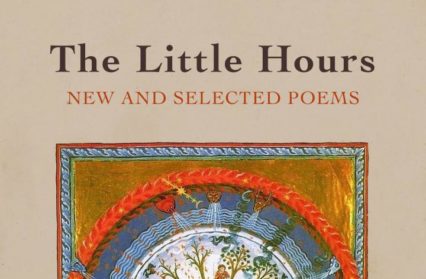Zoe Kramer reviews The Little Hours: New and Selected Poems, a collection of poetry by Hilary Llewellyn-Williams which features poems from her entire career that take inspiration from nature, time and everyday magic.
The Little Hours is Hilary Llewellyn-Williams’ return to poetry after an almost twenty-year break following her last collection, Greenland. The new collection features a selection of poems from her previous works alongside several new additions. While the poems simultaneously explore the vast landscapes of the natural world and the intricacies of a personal and internal world, they all share Llewellyn-Williams’ signature descriptive ease and graceful cadence.
The Little Hours opens with selections from Tree Calendar. Llewellyn-Williams welcomes us into her home and introduces us to an ancient Welsh and Irish way of telling time, where different types of trees mark the year’s progress. Rather than dotting the background or providing scenery, each tree has its own intricate character, observed in close and careful detail. This speciation reflects the passage of time and notes how those observations predate the standardized calendar that the reader may take for granted.
The poems taken from Book of Shadows draw upon a stranger and darker kind of beauty that often hides from sight. A bat stirs in a box; an explorer lies frozen underneath the ice, and the wind makes music in a spider web. There is magic at play, a powerful alchemy in the way one thing transmutes into another, as frightening as it is wonderful. There’s a direct acknowledgement of this magic in the poem ‘Alchemy’:
Only darkness permits mixing
of elements, stirring of essences
in secret, combing dark and bright
into new patterns while we sleep; so dawn
finds us transformed, shifted. Star
particles link us with trees,
dolphins and stones, travel through us
Interconnectedness lies at the core of Llewellyn-Williams’ work. Most evident in the poems from Animaculture, where disparate elements of nature (such as the moon, dandelions, and the sea) all follow the same harmonies, which we as humans can also – on occasion – participate in. Equally, in the selections from Greenland, Llewellyn-Williams seems especially interested in interrogating how the relationship between humanity and nature functions in the modern world and how we often look down now, whereas we used to look up.
Where poems from previous collections tend to wander, the new poems have a more established destination: self-assured, rich with meaning and pointed with intention. Here Llewellyn-Williams discusses memory, not in terms of its power to preserve or immortalise a moment but in the way its fundament failures define it:
we all forget: each day
settling into the rhythms of the heart,
the body’s edges closing, comforting,
Until perhaps years later we awake
to doors shuttering softly
inside us, on some dream
immense and true
yet irretrievable,
dissolving even as we reach for it —
in which we almost remembered,
almost knew.
This sense of loss and frustration in the impermanence of memory is also present in the cycle of poems entitled ‘A Long Goodbye’. She ties together writings from her late husband – who suffered from Dementia – using his notes on his condition to illuminate what the experience was like from the inside, preserving the agency and intellect that was still present despite his illness. It captures the desolation, the fogginess and uncertainty but also the surprising moments of connection from this time.
The Little Hours clues us into the importance of those moments that awaken us from the repetitive motions of everyday life, moments of finding patterns, oddities, or magic in the mundane. Unembellished and sincere in style, it nevertheless carries a striking power in its beauty. It is a well-curated portrait of a brilliant and insightful career in poetry.
The Little Hours: New and Selected Poems is available now from Seren Books.










